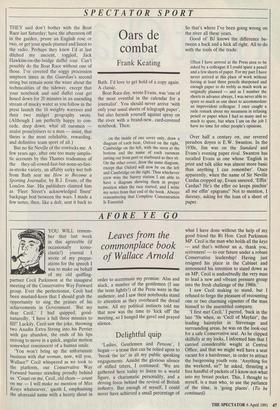SPECTATOR SPORT
Oars de combat
Frank Keating
THEY said don't bother with the Boat Race last Saturday; have the afternoon off in the garden, prune an English rose or two, or get your spuds planted and listen to the radio. Perhaps they knew I'd at last ditched my ancient, toggled, Jack Hawkins-on-the-bridge duffel coat. Can't possibly do the Boat Race without one of those. I've covered the soggy procession umpteen times as the Guardian's second string but remain none the wiser about the technicalities of the tideway, except that your notebook and said duffel coat get hosed down for 20 minutes in an unending stream of mucky water as you follow in the press launch the 16 weighty warriors and their two midget geography swots. (Although I am perfectly happy to con- cede, deep down, what all oarsmen zealot proselytisers to a man — insist, that theirs is the most relishable, rewarding, and definitive team sport of all.) But no Sir Neville of the rowlocks me. A few years ago, after one too many simplis- tic accounts by this Thames tradesman of the they-all-rowed-fast-but-none-so-fast- as-stroke variety, an affably sarky wet bob from Bath sent me How to Become a Sporting Journalist, by B.J. Evans, of the London Star. His publishers claimed him as 'Fleet Street's acknowledged finest' backpage bod between the wars. I made a few notes, then, like a dolt, sent it back to Bath. I'd love to get hold of a copy again. A classic.
Boat Race day, wrote Evans, was 'one of the most eventful in the calendar for a journalist'. You should never arrive 'with only your usual sheets of telegraph paper', but also furnish yourself against spray on the river with a brand-new, card-covered notebook. Then:
...on the inside of one cover only, draw a diagram of each boat, Oxford on the right, Cambridge on the left, with the stern at the bottom and the name of each oarsman jutting out from port or starboard as they sit. On the other cover, draw the same diagram, except that Oxford will now be on the left and Cambridge on the right. Thus whichever crew wins the Surrey station I am able to have a diagram showing them in proper position when the race started, and I write my notes from that end of the book. Always remembering that Complete Concentration Is Essential.
So that's where I've been going wrong on the river all these years.
Good ol' BJ knows the difference be- tween a hack and a hick all right. All to do with the tools of the trade:
Often I have arrived at the Press area to be asked by a colleague if I could spare a pencil and a few sheets of paper. For my part I have never arrived at this place of work without having at least three pencils sharpened and enough paper to do trebly as much work as originally planned — and as I number the sheets in advance always, I was never able to spare so much as one sheet to accommodate an improvident colleague. I once caught a rude remark about my meanness in refusing pencil or paper when I had so many and so much to spare, but when I am on the job I have no time for other people's opinions.
Over half a century on, our revered pressbox doyen is E.W. Swanton. In the 1930s, Jim was on the Standard and Evans's evening paper rival. Swanton has recalled Evans as one whose 'English in print and talk alike was almost more basic than anything I can remember'. Once apparently, when the name of Sir Neville Cardus cropped up, Evans sneered, 'Effin' Cardus? He's the effer oo keeps pinchin' all me effin' epigrams!' Not to mention, I daresay, asking for the loan of a sheet of paper.


















































 Previous page
Previous page